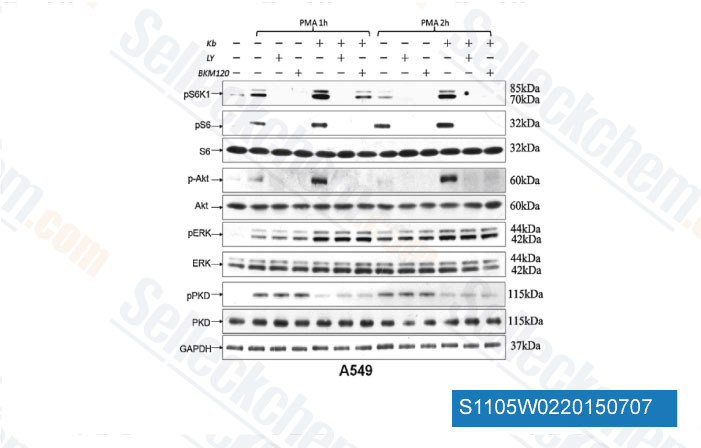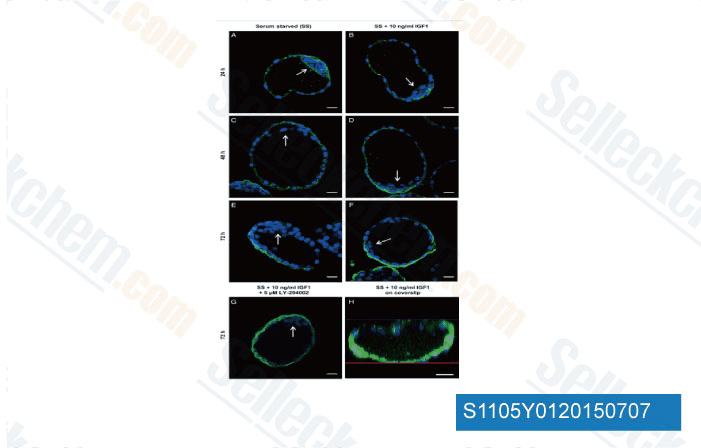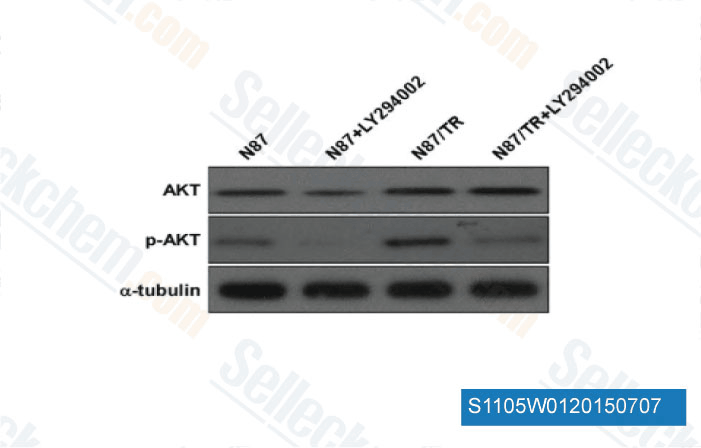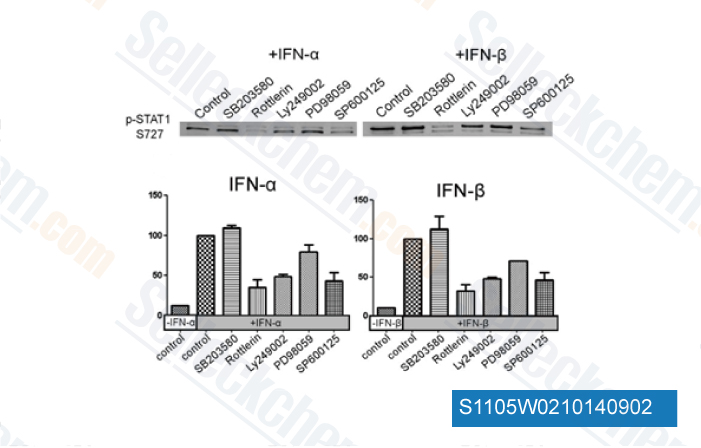|
Toll Free: (877) 796-6397 -- USA and Canada only -- |
Fax: +1-832-582-8590 Orders: +1-832-582-8158 |
Tech Support: +1-832-582-8158 Ext:3 Please provide your Order Number in the email. |
Technical Data
| Formula | C19H17NO3 |
||||||
| Molecular Weight | 307.34 | CAS No. | 154447-36-6 | ||||
| Solubility (25°C)* | In vitro | DMSO | 31 mg/mL (100.86 mM) | ||||
| Ethanol | 31 mg/mL (100.86 mM) | ||||||
| Water | Insoluble | ||||||
| In vivo (Add solvents to the product individually and in order) |
|
||||||
|
* <1 mg/ml means slightly soluble or insoluble. * Please note that Selleck tests the solubility of all compounds in-house, and the actual solubility may differ slightly from published values. This is normal and is due to slight batch-to-batch variations. * Room temperature shipping (Stability testing shows this product can be shipped without any cooling measures.) |
|||||||
Preparing Stock Solutions
Biological Activity
| Description | LY294002 (SF 1101, NSC 697286) is the first synthetic molecule known to inhibit PI3Kα/δ/β with IC50 of 0.5 μM/0.57 μM/0.97 μM, respectively; more stable in solution than Wortmannin, and also blocks autophagosome formation. It not only binds to class I PI3Ks and other PI3K-related kinases, but also to novel targets seemingly unrelated to the PI3K family. LY294002 also inhibits CK2 with IC50 of 98 nM. LY294002 is a non-specific DNA-PKcs inhibitor and activates autophagy and apoptosis. | ||||||||||
|---|---|---|---|---|---|---|---|---|---|---|---|
| Targets |
|
||||||||||
| In vitro | LY294002 is not exclusively selective for the PI3Ks, and could in fact act on other lipid kinases and additional apparently unrelated proteins. LY294002 is shown to inhibit not only mTOR and DNA-PK, but also other protein kinases, such as CK2 (casein kinase 2) and Pim-1[5]. LY294002 inactivates Akt/PKB, consequently inhibiting cell proliferation and inducing apoptosis. LY294002 demonstrates a remarkable growth-inhibitory and apoptosis-inducing effect in these colon cancer cell lines, with decreased expression of phosphorylated Akt (Ser473). [2]LY294002 induces marked nuclear pyknosis and diminished cytoplasmic volume in the tumor cells. Thus, LY294002 markedly inhibits ovarian cancer cell proliferation in vitro. LY294002 induces specific G1 arrest in cell growth, leading to almost complete inhibition of melanoma cell proliferation and partial inhibition of MG-63 (osteosarcoma cell line) proliferation. The effect of LY294002 on cell cycle progression may provide insights into a possible link between the PI3K activation pathway and cancer cell cycle regulation. [3] |
||||||||||
| In vivo | LY294002 also results in suppression of tumor growth and induction of apoptosis, especially in the LoVo tumors, and therefore shows remarkable effectiveness in the mouse peritonitis carcinomatosa model. [2] LY294002 significantly inhibits growth and ascites formation of ovarian carcinoma. [3] |
Protocol (from reference)
| Kinase Assay: |
|
|---|---|
| Cell Assay: |
|
| Animal Study: |
|
References
Customer Product Validation

-
Data from [Data independently produced by Int J Biochem Cell Biol, 2015, 60, 34-42]

-
Data from [Data independently produced by Hum Reprod, 2015, 30(2), 284-98]

-
Data from [Data independently produced by Sci Rep, 2015, 5, 11634]

-
Data from [Hepatology, 2014, 59(4), 1262-72]
Selleck's LY294002 has been cited by 1946 publications
| FGF21 protects against HFpEF by improving cardiac mitochondrial bioenergetics in mice [ Nat Commun, 2025, 16(1):1661] | PubMed: 39955281 |
| X-linked myopathy with excessive autophagy: characterization and therapy testing in a zebrafish model [ EMBO Mol Med, 2025, 10.1038/s44321-025-00204-8] | PubMed: 39994482 |
| PDPN+ cancer-associated fibroblasts enhance gastric cancer angiogenesis via AKT/NF-κB activation and the CCL2-ACKR1 axis [ MedComm (2020), 2025, 6(1):e70037] | PubMed: 39764562 |
| Human epicardial organoids from pluripotent stem cells resemble fetal stage with potential cardiomyocyte- transdifferentiation [ Cell Biosci, 2025, 15(1):4] | PubMed: 39825425 |
| Downregulated TFPI2 Accelerates Skin Aging by Repressing the Cell Cycle through Phosphoinositide 3-Kinase/Protein Kinase B/CDC6 Pathway [ J Invest Dermatol, 2025, S0022-202X(25)00033-8] | PubMed: 39848565 |
| Cartilage Oligomeric Matrix Protein Promotes Radiation Resistance in Non-Small Cell Lung Cancer In Vitro [ Int J Mol Sci, 2025, 26(6)2465] | PubMed: 40141111 |
| 20(R)-ginsenoside Rg3 protects against focal cerebral ischemia‒reperfusion injury by suppressing autophagy via PI3K/Akt/mTOR signaling pathway [ Neuropharmacology, 2025, 263:110226] | PubMed: 39557153 |
| A pathological joint-liver axis mediated by matrikine-activated CD4+ T cells [ Signal Transduct Target Ther, 2024, 9(1):109] | PubMed: 38714712 |
| A pathological joint-liver axis mediated by matrikine-activated CD4+ T cells [ Signal Transduct Target Ther, 2024, 9(1):109] | PubMed: 38714712 |
| Organismal metabolism regulates the expansion of oncogenic PIK3CA mutant clones in normal esophagus [ Nat Genet, 2024, 10.1038/s41588-024-01891-8] | PubMed: 39169259 |
RETURN POLICY
Selleck Chemical’s Unconditional Return Policy ensures a smooth online shopping experience for our customers. If you are in any way unsatisfied with your purchase, you may return any item(s) within 7 days of receiving it. In the event of product quality issues, either protocol related or product related problems, you may return any item(s) within 365 days from the original purchase date. Please follow the instructions below when returning products.
SHIPPING AND STORAGE
Selleck products are transported at room temperature. If you receive the product at room temperature, please rest assured, the Selleck Quality Inspection Department has conducted experiments to verify that the normal temperature placement of one month will not affect the biological activity of powder products. After collecting, please store the product according to the requirements described in the datasheet. Most Selleck products are stable under the recommended conditions.
NOT FOR HUMAN, VETERINARY DIAGNOSTIC OR THERAPEUTIC USE.
